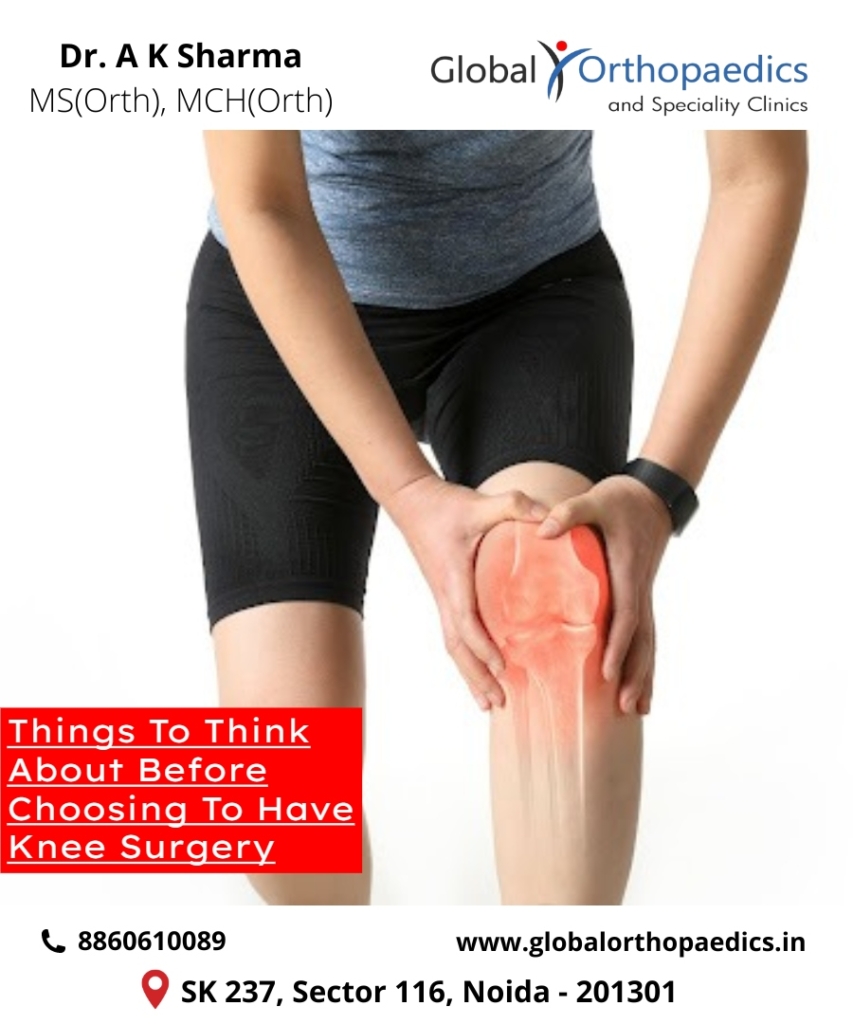Knee difficulties are among the most common health concerns worldwide, affecting people of all ages and lifestyles. They can range from acute accidents to chronic disorders like arthritis. The effects of knee issues on quality of life can be profound, whether the patient is an elderly person with osteoarthritis or a young athlete dealing with a sports injury. Knee surgery is frequently the best course of action in these situations in order to reduce discomfort, regain function, and increase mobility. However, since knee surgery is a significant procedure with risks and complications, it should not be chosen hastily. In this blog, we examine a few important things that patients need to know before having knee surgery. Now let’s get started.

Severity
The severity of the problem heavily influences the choice to have knee surgery. Disorders like osteoarthritis or ligament injuries have different level of severity, which affects the treatment that is selected. While less severe cases may respond well to non-surgical therapies, more severe cases may require surgery in order to provide meaningful relief. Selecting the right treatment plan and assessing the severity of the ailment depend on an accurate diagnosis made possible by imaging technology.
Non-Surgical Interventions
Before deciding to have surgery, non-surgical options must be investigated. Usually, these consist of:
– Enhancing knee strength and flexibility through physical therapy can often reduce pain and improve function.
– Medication and lifestyle modifications, like controlling weight and doing specific workouts, are also important.
These techniques have the potential to postpone or completely eliminate the need for surgical intervention, especially in the early stages or for certain disorders. It’s critical that people carefully consider these choices, frequently in conjunction with medical professionals, to ascertain which ones are best for their particular knee problems.
What is the Best Technology for Knee Surgery?
Technological developments in medicine have increased the range of knee surgery choices. They include minimally invasive arthroscopic operations, robotic-assisted procedures, and conventional open surgeries. Each has unique benefits and drawbacks.
The particular knee condition of the patient, the experience of the surgeon, and the expected results should all be taken into consideration when choosing the technology. Patients must be aware of these choices and consult with their surgeon to determine which technological technique best meets their needs, considering variables including recovery time, precision, and long-term efficacy.
Experience and Reputation of Surgeon
The surgeon’s experience and reputation play a major role in the outcome of knee surgery. Patients can feel secure knowing that they are under the care of the best knee replacement surgeon in Noida at Global Orthopaedics and Speciality Clinics.
In addition to being skilled in cutting-edge surgical methods, Dr. Ashok Kumar Sharma at Global Orthopaedics and Speciality Clinics also keep up with the most recent advancements in knee surgery. Dr. A K Sharma is a top pick for anyone looking for the best knee replacement surgeon in Delhi NCR because of his dedication to patient care and guaranteeing good surgery outcomes, which is demonstrated by his favorable patient testimonials and strong community status.
Age and General Health
The decision to have knee surgery is heavily influenced by age and general health. While older people may prioritize improved mobility and pain alleviation, younger people may choose surgery to maintain an active lifestyle. Pre-existing medical issues play a crucial role in determining surgery risks and recovery time. It is essential to have a thorough assessment of one’s health, taking age into account, in conjunction with medical professionals. To decide whether the surgery is necessary and to predict possible results, this evaluation is crucial.
Surgery and Implant Type
The kind of implant and surgical technique are customized to meet the demands of each patient. Options include resurfacing, partial replacements, and total knee replacements. The decision is based on a number of variables, including the degree of knee damage, the patient’s activity level, and lifestyle needs. The materials, construction, and design of implants differ, which affects their lifespan and functionality. It’s crucial to go over these possibilities in-depth with the surgeon, taking into account both their advantages and disadvantages. This guarantees that the implant and surgical technique selected meet the unique needs of the patient and their expectations following surgery.
Risks and Complications
Like any major medical treatment, knee surgery has possible risks and problems. These could include blood clots, implant difficulties, infection, or ongoing knee problems. While improvements in surgical methods have reduced the risks associated with them, total eradication is still unattainable. To enable them to make an informed decision, patients must be properly informed about these possible consequences, understanding their significance and likelihood.
Recovery Period
The length of recovery varies based on individual circumstances and the type of knee surgery. Usually lasting a few weeks to many months, the rehabilitation process entails rest, physical treatment, and a gradual return to activity. It’s important to have reasonable expectations for your recuperation, which should include scheduling time off work and making arrangements for at-home help. A crucial step in the surgical decision-making process is this.
Cost
When deciding whether to have knee surgery, cost is a crucial factor to take into account because costs can vary greatly and include surgical procedures, hospital stays, surgeon fees, and rehabilitation after surgery. Indirect expenses should also be included, such as lost wages throughout the healing process. To avoid unpleasant surprises, it’s imperative to fully understand insurance coverage and investigate all financial options.
Conclusion
The decision to have knee surgery requires a thorough assessment of a number of aspects, such as determining the severity of the knee disease, investigating non-surgical options, being aware of technical improvements, and taking one’s own health and financial situation into account. Dr. Ashok Kumar Sharma stands out as a model of excellence in surgical competence and patient care. We invite you to consult with him at Global Orthopaedics and Speciality Clinics for a personalized evaluation and to learn more about your options for treatment.


